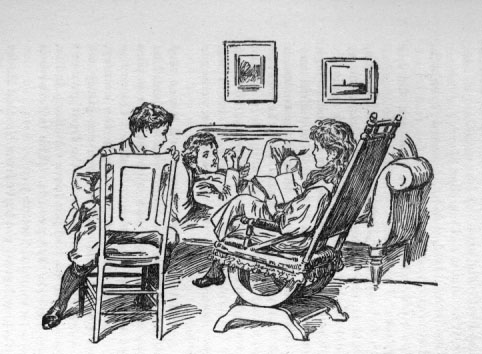Wednesday’s post has me thinking about my fascination with stories about people who read stories. When I was a child, my reading set me apart from others, and my current theory is that reading about people who love books as much as I did made me feel less alone and less weird. In today’s post, I’ve begun a list of all those books that I remember turning to for consolation, up through adolescence.
E. Nesbit, The Treasure Seekers and The Would-be-goods
My father read me these E. Nesbit books about the Bastable children who, in spite of their best intentions, are always getting into trouble. Oswald Bastable and his siblings are great fans of Kipling’s The Jungle Books and greet each other with the words, “Good hunting.” Their love of Kipling pays off as it wins over a rich uncle, who saves them from poverty.
My friend Rachel Kranz told me that she was raised on the Edward Eager Magic books (like Half Magic and Seven Day Magic), where the children refer to Nesbit’s books. I’m sorry that I didn’t know about them as a child as I’m sure I would have fallen in love with them.
A. A. Milne, Winnie the Pooh and Kenneth Grahame, The Wind in the Willows
These works don’t entirely fit my schema since Pooh and Ratty are not readers but poets. Nevertheless, it made sense to me that they would be drawn to poetry and that those around them wouldn’t understand this attraction. (Mole is respectful, Piglet less so.)
Arthur Ransome, Swallows and Amazons
The children in the Ransome books (all of which I read) are drawn to Stevenson’s Treasure Island to help them in their imaginary play.
Robert Louis Stevenson, “The Land of Story-Books”
Speaking of Stevenson, I related to this poem from A Child’s Garden of Verses:
At evening when the lamp is lit,
Around the fire my parents sit;
They sit at home and talk and sing,
And do not play at anything.
Now, with my little gun, I crawl
All in the dark along the wall,
And follow round the forest track
Away behind the sofa back.
There, in the night, where none can spy,
All in my hunter’s camp I lie,
And play at books that I have read
Till it is time to go to bed.
These are the hills, these are the woods,
These are my starry solitudes;
And there the river by whose brink
The roaring lions come to drink.
I see the others far away
As if in firelit camp they lay,
And I, like to an Indian scout,
Around their party prowled about.
So when my nurse comes in for me,
Home I return across the sea,
And go to bed with backward looks
At my dear land of Story-books.
Mark Twain, Huckleberry Finn
When I read Huckleberry Finn in high school, I recognized that Tom was borrowing from Alexander Dumas, either The Count of Monte Cristo or the sequel to The Three Musketeers (Twenty Years After) when he concocts an elaborate escape plan for Jim.
Charles Dickens, David Copperfield
David doesn’t have much going for him when he finds himself thrust into a boarding school by his evil stepfather Mr. Murdstone, but he has read a lot of novels. Steerforth, the boy who all but runs the school, admires David for this knowledge, which raises David’s status with the others. I dreamed that my own reading would raise my stature in some way.
Charlotte Bronte, Jane Eyre
I related to Jane’s desire to withdraw from her unkind surroundings into a world of books when she is a child.
As I compile the list, I realize that these books were the exceptions rather than the rule. Most of the characters in the books I loved were not readers (Alice, Jack Hawkins, Frodo Baggins). In fact, sometimes the characters actually leave books in order to have adventures: the Penvensies decide to explore the house rather than drearily read in The Lion, the Witch, and the Wardrobe, and Mary pulls Colin away from his books in The Secret Garden. It’s as though the authors are like the hypocritical lady authors that Jane Austen censures in Northanger Abbey. Defending Katherine for her love of gothic novels, Austen writes,
I will not adopt that ungenerous and impolitic custom so common with novel-writers, of degrading by their contemptuous censure the very performances, to the number of which they are themselves adding—joining with their greatest enemies in bestowing the harshest epithets on such works, and scarcely ever permitting them to be read by their own heroine, who, if she accidentally take up a novel, is sure to turn over its insipid pages with disgust. Alas! If the heroine of one novel be not patronized by the heroine of another, from whom can she expect protection and regard?
C. S. Lewis, Frances Hodgson Burnett, and others may not censure their characters for reading novels, but they certainly don’t show them reading as avidly as they themselves read.
Maybe there’s a good reason for this. Maybe reading for them felt so real that they had to talk about their characters as if they had stepped out of books and obliterated all the traces. The Pevensies aren’t shown to be readers but a very bookish soul created them.
Now I, as a literary scholar, seek to rediscover those traces, hearing echoes of (in The Narnia Chronicles) Nesbit, Grahame, Jonathan Swift, John Milton, James Barrie, George MacDonald, and countless others. I no longer require that the books that inspired the authors be explicitly named.


